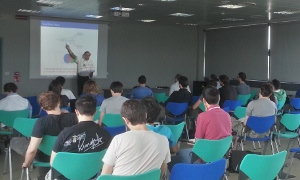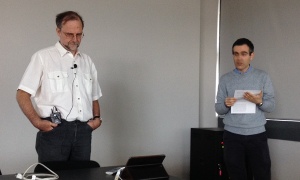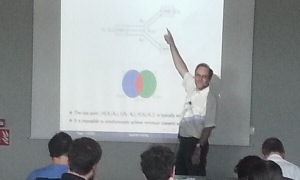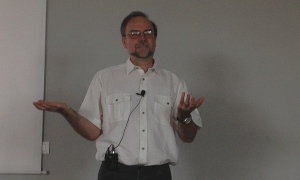Seminar by prof. Ken Rose (UCSB) at Politecnico
 The Internet Media Group is delighted to host a seminar by prof. Kenneth Rose (UCSB) on “A common information framework for layered coding (and example application to audio)”.
The Internet Media Group is delighted to host a seminar by prof. Kenneth Rose (UCSB) on “A common information framework for layered coding (and example application to audio)”.
The seminar will be held on Monday 12, 2014, at 14:30, in the Department of Control and Computer Engineering (DAUIN), meeting room 5th floor.
Abstract: This talk revisits the question of scalable coding. Often the same content is served at different data rates and quality levels to various users. The simplest approach is to store and transmit independent copies of the signal at different quality levels, which is obviously wasteful in resources. The alternative approach of scalable coding imposes a rigid hierarchical structure, wherein the base layer information is subsumed in the higher layer information, and is widely recognized to incur a performance penalty compared to independent encoding. Instead of assuming such a rigid structure, we propose sharing only an appropriate subset (carefully selected) of base layer information with the enhancement layer. Concepts from classical information theory (common information as defined by Wyner and by Gacs-Korner) provide a foundation and imply that this flexibility is indeed key to achieve efficiency in storing and transmitting signals at different quality levels, by optimally sharing information that is “common” to them. As an example, we then employ this framework to audio coding with the MPEG Scalable AAC and describe an optimization scheme to jointly select parameters of all the layers. Results for this coder provide practical evidence for the utility of such a flexible framework.
Biographical info:  Kenneth Rose joined the Department of Electrical and Computer Engineering, University of California, Santa Barbara, in 1991 after receiving his Ph.D. from Caltech. His research activities are in the areas of information theory, signal compression, source-channel coding, video/audio coding and processing, pattern recognition, and nonconvex optimization. He is particularly interested in application of information and estimation theoretic approaches to fundamental problems in signal processing, as well as in the underlying relations between information theory and statistical physics. Recent research contributions of his group include methods for end-to-end distortion estimation in video transmission and streaming over lossy packet networks, optimal prediction in scalable video and audio coding, distributed source coding and sensor networks, as well as information theoretic approaches to optimization with applications in pattern recognition, signal compression and content-based search and retrieval from high-dimensional databases. His optimization algorithms have been adopted by others in numerous disciplines beside electrical engineering and computer science, including physics, chemistry, biology, medicine, materials, astronomy, geology, psychology, linguistics, ecology, and economics. Among various professional activities, Rose has served as an Area Editor for the IEEE Transactions on Communications, as a member of the IEEE Signal Processing Society’s Image and Multidimensional Signal Processing Technical Committee, and the Multimedia Signal Processing Technical Committee, and as co-Chair of the technical program committee of the 2001 IEEE Workshop on Multimedia Signal Processing, Cannes, France. He is a fellow of the IEEE and was the recipient or co-recipient of several journal and conference paper awards.
Kenneth Rose joined the Department of Electrical and Computer Engineering, University of California, Santa Barbara, in 1991 after receiving his Ph.D. from Caltech. His research activities are in the areas of information theory, signal compression, source-channel coding, video/audio coding and processing, pattern recognition, and nonconvex optimization. He is particularly interested in application of information and estimation theoretic approaches to fundamental problems in signal processing, as well as in the underlying relations between information theory and statistical physics. Recent research contributions of his group include methods for end-to-end distortion estimation in video transmission and streaming over lossy packet networks, optimal prediction in scalable video and audio coding, distributed source coding and sensor networks, as well as information theoretic approaches to optimization with applications in pattern recognition, signal compression and content-based search and retrieval from high-dimensional databases. His optimization algorithms have been adopted by others in numerous disciplines beside electrical engineering and computer science, including physics, chemistry, biology, medicine, materials, astronomy, geology, psychology, linguistics, ecology, and economics. Among various professional activities, Rose has served as an Area Editor for the IEEE Transactions on Communications, as a member of the IEEE Signal Processing Society’s Image and Multidimensional Signal Processing Technical Committee, and the Multimedia Signal Processing Technical Committee, and as co-Chair of the technical program committee of the 2001 IEEE Workshop on Multimedia Signal Processing, Cannes, France. He is a fellow of the IEEE and was the recipient or co-recipient of several journal and conference paper awards.

